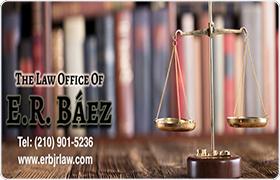Helotes Felony Lawyer, Texas, page 2
Sponsored Law Firm
-
 x
x

Click For More Info:
-
The Law Office of E.R. Báez
700 N. Saint Mary's Street Suite 1400 San Antonio, TX 78205» view mapCriminal Defense Law The Pastor Lawyer
Every client is special to us and every client will be treated with respect and dignity. No matter how difficult the case may be, Mr. Báez will treat you with the upmost dignity.
800-903-7181
BRANDON TODD HUDSON (brandon)
Criminal, Felony, White Collar Crime, Juvenile Law
Status: In Good Standing *Status is reviewed annually. For latest information visit here
 E.R. Báez San Antonio, TX
E.R. Báez San Antonio, TX Practice AreasExpertise
Practice AreasExpertise